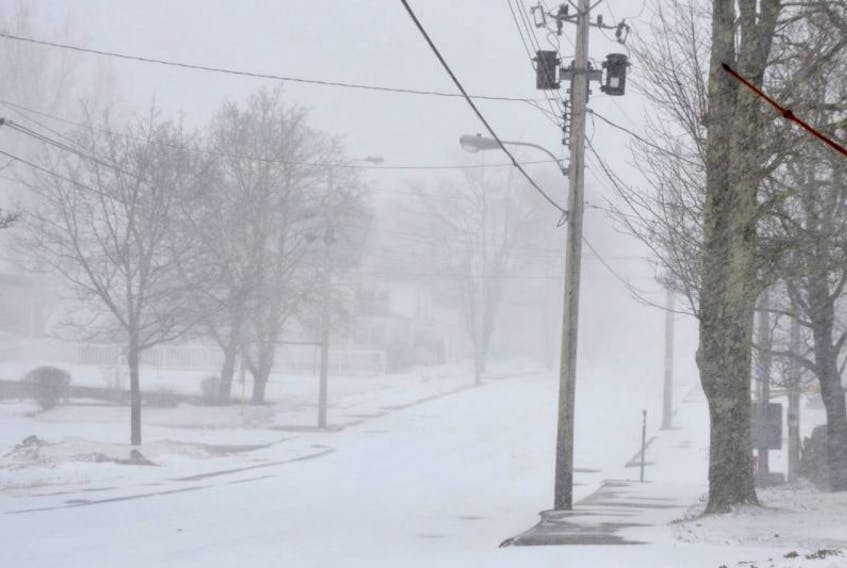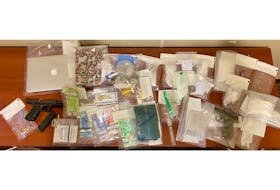NEW GLASGOW
John Davison is someone who keeps a close eye on the weather.
He isn’t a meteorologist but rather a co-ordinator with Regional Emergency Management Office – Pictou County who is on the lookout for anything Mother Nature might throw his way.
“Prior to the arrival of a storm, people are asked to be prepared with water and food in their house that will last them 72 hours,” he said.
REMO communicates and co-ordinates with local emergency personnel and the public to help everyone survive unpredictable weather that might come to Pictou County in any season.
During the winter months, it watches road conditions, possible power outages and the need for emergency relief in the form of warming centres after a storm passes by.
Davison said power outages are a major concern in the winter months because some people rely on electricity to heat their homes. If alternative heat sources are used, such as wood stoves, it is recommended that they are cleaned and checked regularly to prevent flue fires.
Electricity also affects how people communicate, especially those who rely solely on cellphones. Davison said it is a good idea to have a portable battery charged and ready to go so that people can use it as a backup.
REMO has a Twitter account it updates regularly and a crank radio is also a useful tool for homeowners wanting to keep informed when the power is out.
Regarding cold weather, he said people to need to keep a close eye on children to make sure they are not subject to frostbite or hypothermia.
“Be very careful going for a walk,” he said. “There is a lot of ice on the ground.”
The old campaign slogan, “Arrive Alive” is also a helpful reminder that people need to take precautions on the roads. If poor weather is forecast, people should give themselves extra time for driving or make alternative plans.
Const. Ken MacDonald with the New Glasgow Regional Police said it is important for motorists to have their vehicles checked for regular maintenance and make sure their tires are for winter driving.
He said emergency kits in vehicles have also been known to save lives.
“Plan your route and let someone know your destination and arrival time,” he said. “If you do get into a snow bank and can’t move, stay in the vehicle, run the engine sporadically and be aware of the exhaust. Use a flashlight and try not to fall asleep.”
The basics
During an emergency you may be without electricity or running water. You should have some basic supplies prepared so you and your family can be self-sufficient for at least 72 hours. Make sure your family’s emergency kit is easy to carry. For example, keep it in a backpack, duffel bag or suitcase with wheels. Store it in an easily accessible place and make sure everyone knows where it is. Check your kit twice a year and replace any outdated items. Food and water should be replaced once a year.
Basic emergency kit:
Water (at least two litres per person per day). Use small bottles that can be carried in case of an evacuation order.
Food that won’t spoil, such as canned or dried foods and energy bars.
Manual can opener
Wind-up or battery-powered radio (and extra batteries)
Wind-up or battery-powered flashlight (and extra batteries)
Cash (small bills) and change (for pay phones)
First-aid kit
Extra keys for your car and house
Emergency plan and contact information
Medications, important documents, infant formula, pet food, special items for family members with disabilities or special needs, or any other items necessary to personalize your kit
Recommended additional items:
Additional two litres of water per person per day (for cooking, cleaning, etc.)
Change of clothing and footwear for each family member
Blankets or sleeping bags
Toiletries
Hand sanitizer
Plastic garbage bags
Utensils
Toilet paper
Household chlorine bleach or water purifying tablets
Basic tools (hammer, screwdrivers, pliers, wrench, work gloves, dust mask, pocket knife)
Small fuel-driven stove with fuel (follow manufacturer’s directions and store properly)
Duct tape (e.g. to tape up windows, doors, air vents, etc.)
Whistle (to attract attention)
Car emergency kit:
Shovel
Ice scraper and brush
Sand, salt or kitty litter; traction mats
Booster cables
Tow chain
Methyl hydrate (for fuel line and windshield de-icing)
First-aid kit
Fire extinguisher
Wind-up or battery-powered flashlight (and extra batteries)
Road maps
Warning light or road flares
Emergency food pack
Extra clothing and footwear
Cloth or roll of paper towels
Axe or hatchet
Compass
Matches and a “survival” candle in a deep can (to warm hands, heat a drink or use as an emergency light)
Blanket (special “survival” blankets are best)
Evacuation “Go Kit”:
In the event that you have to evacuate your home a portable emergency “go kit” is also recommended. Your kit should include:
Copies of important documents (Insurance papers, deeds, wills)
Seven-day supply of prescription medications
Local map
Extra clothing and footwear
Cash (small bills) and change (for pay phones)
Extra keys for your car and house
Emergency plan and contact information
Infant formula, pet food, special items for family members with disabilities or special needs, or any other items necessary to personalize your kit
– Provided by EMO









